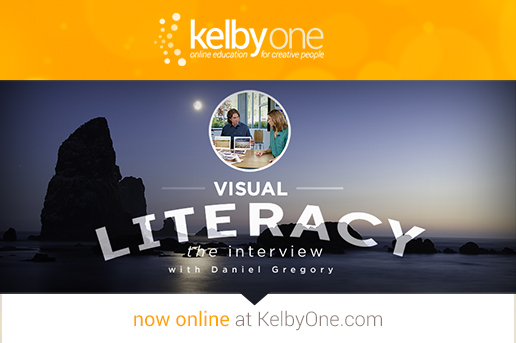In case you missed it, last week my first class appeared over at Kelby One. I am so excited to have a class with the Kelby One team. When I first started adding digital workflows into my photographic life, I attended a Photoshop World Conference in Las Vegas. It was a great experience. Amazing people. Amazing classes. Amazing instructors. At that time, I never imagined that I would have a class of my own. I am honored.
The class is a dialog with Mia McCormick and RC Concepcion to introduce the concept of visual literacy, or how to meaningfully talk about your work. The concept of visual literacy is huge. You can spend a lifetime studying how to speak about art. It is a learned skill. It is process to develop the language and know what to talk about. It is a skill to put your work in the context of the broader photographic community. It is a skill to find relationships not just photographic circles but in other art circles as well. Those are all important skills.
Without ever realizing it, we can create work we love and work we hate. When we don’t know why or understand why one image moves us more than another we are unable to repeat success. We are left with just the happy accident. We just keep blindly moving forward hoping for the best. When we do talk about our work, we tend to fall back on easy phrases focusing on technical knowledge and bragging about social media stats. When I thought about this class, I always imagined it as a conversation around a table you would have with friends. In those conversations we can find words, ideas and concepts providing insight and meaning to our work. I also thought about how to introduce a concept that is nebulous and without clear answers. Art is subjective. There are no absolutes of shutter speeds and f/stop values. It is more etherial. There is no right and wrong.
As Mia and I worked on the course outline, it became clear that we had to start at the beginning focusing in on how we speak about our own work and focusing in on the foundation of finding meaning in our own work. Focusing on how to start to build your own vocabulary about your work. How do you find meaning/intention in your work? When to listen to your inner critic? Why real feedback is so important to the process once you find your footing. With so much to cover, we felt that focusing internally really made sense.
My hope is that as we all start to better understand photographs we can start to have better questions, conversations and discourse about photography. We can study photographers from the past and put our work in the proper context. We can understand the roles of influences and mentors in a more meaningful way. I hope that the class offers some support to you as you find your own voice as an artist. If it resonates, who knows maybe we will have to think about doing a part II.

